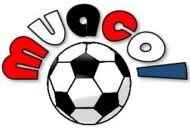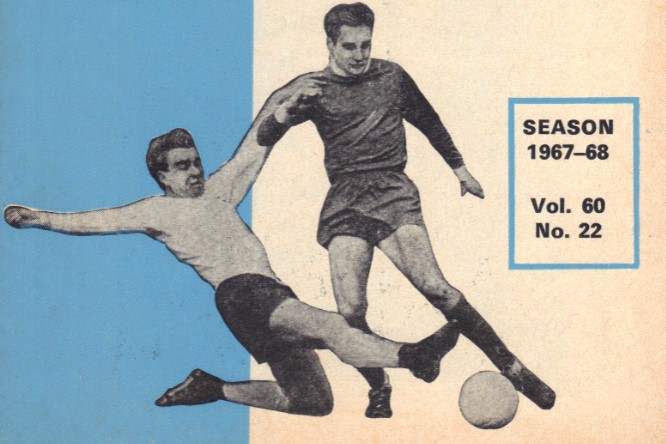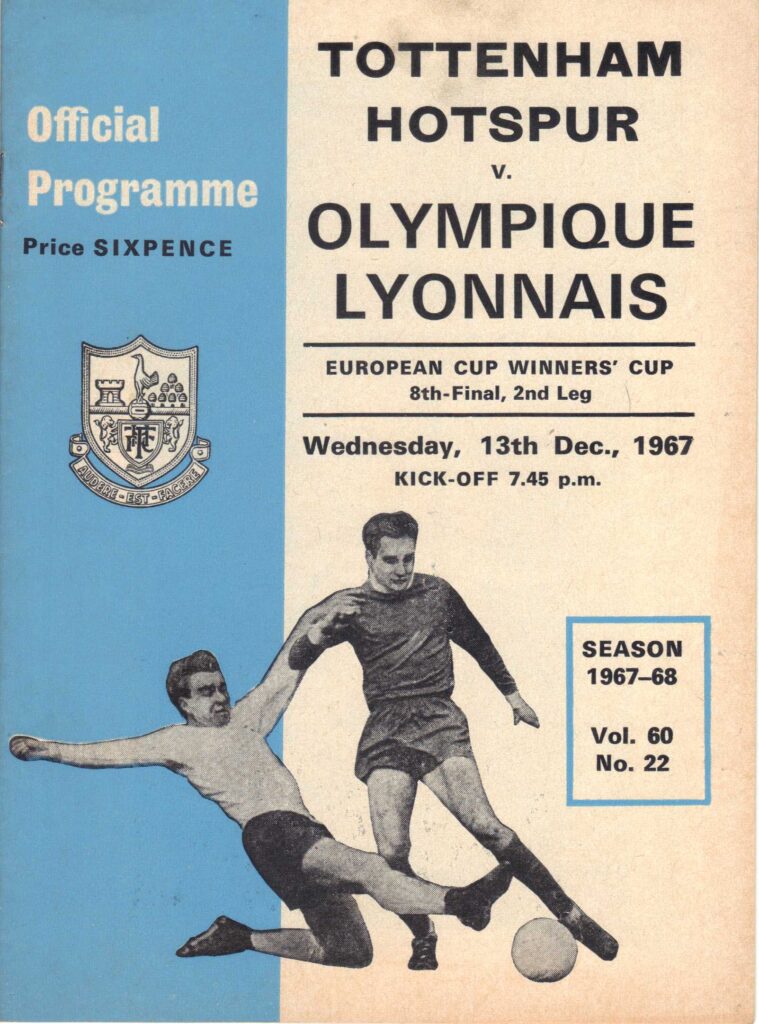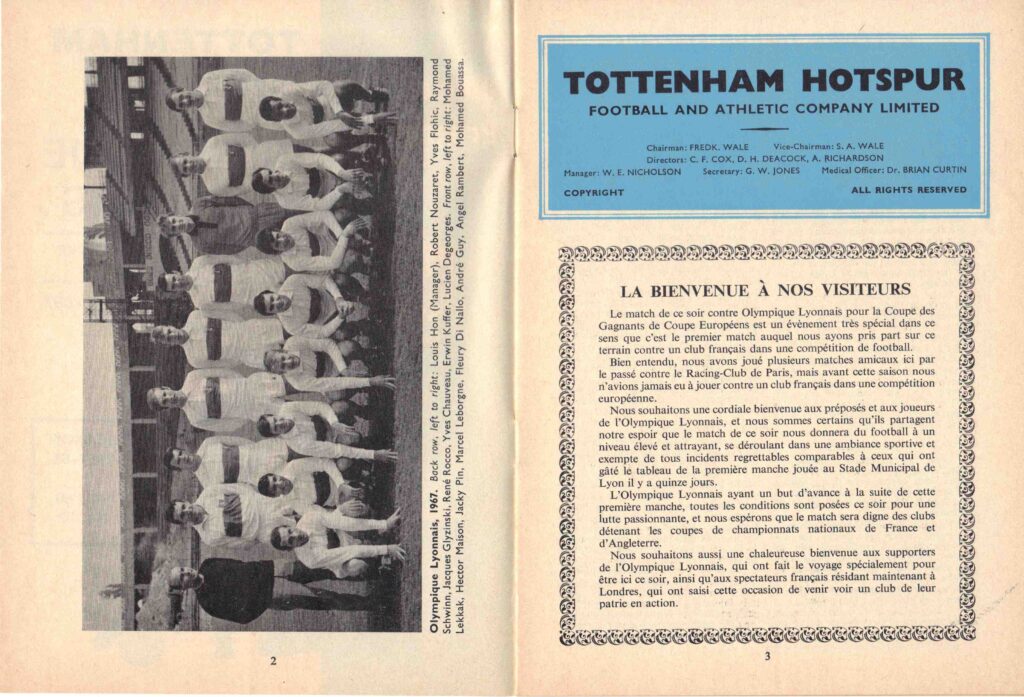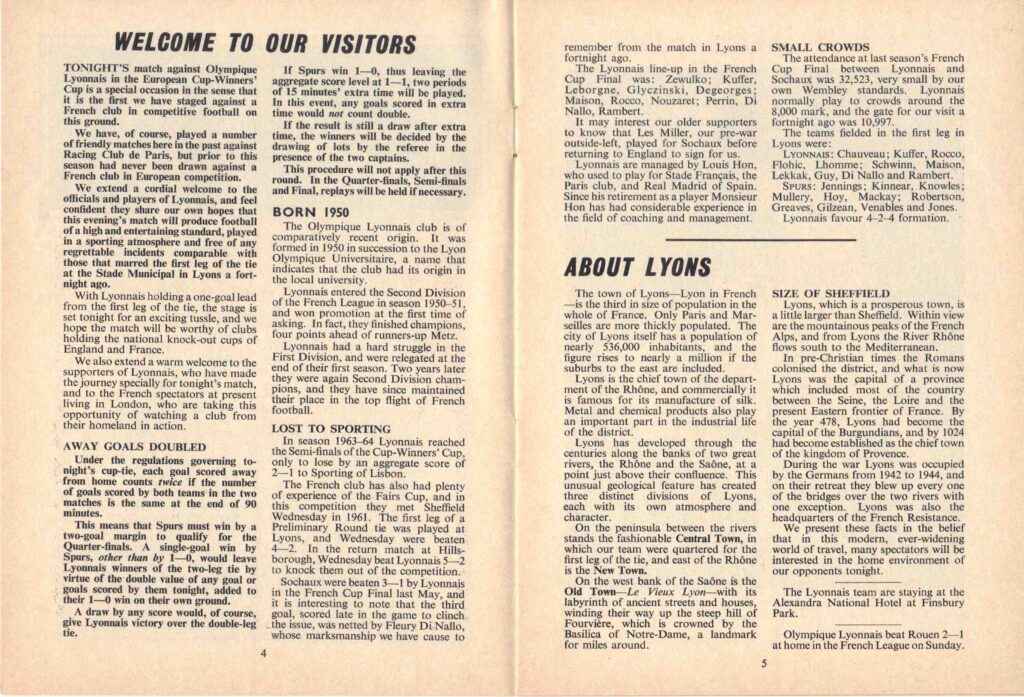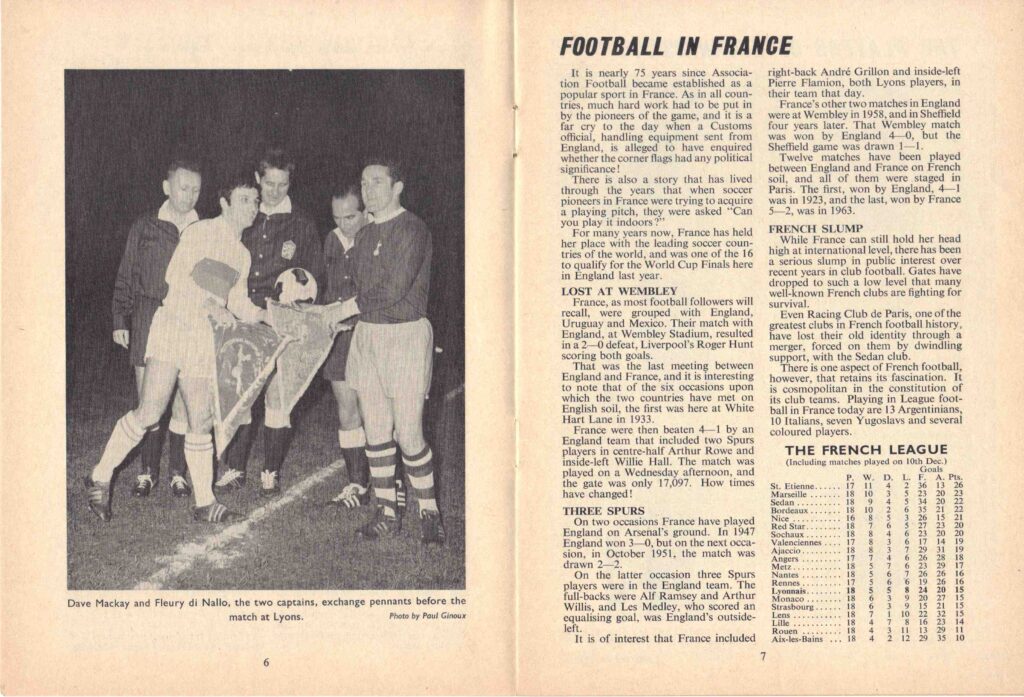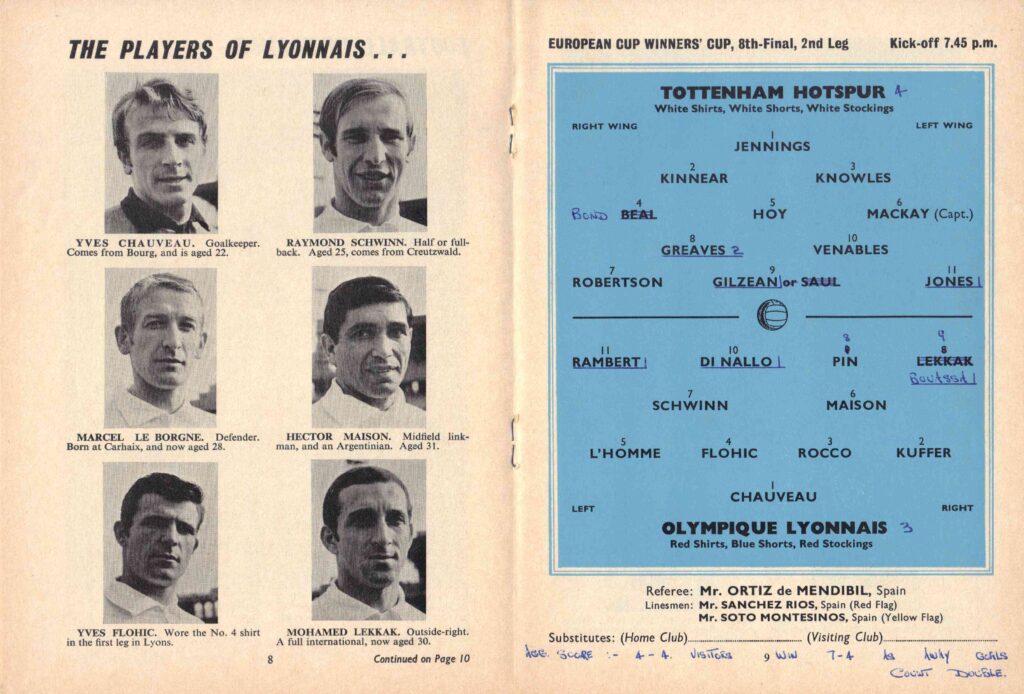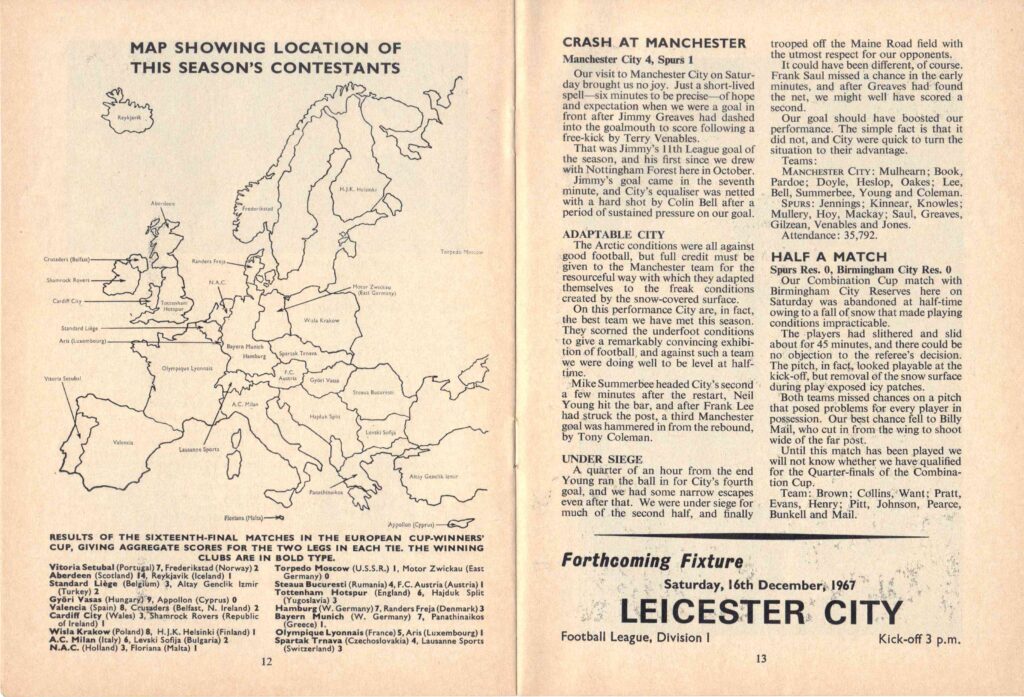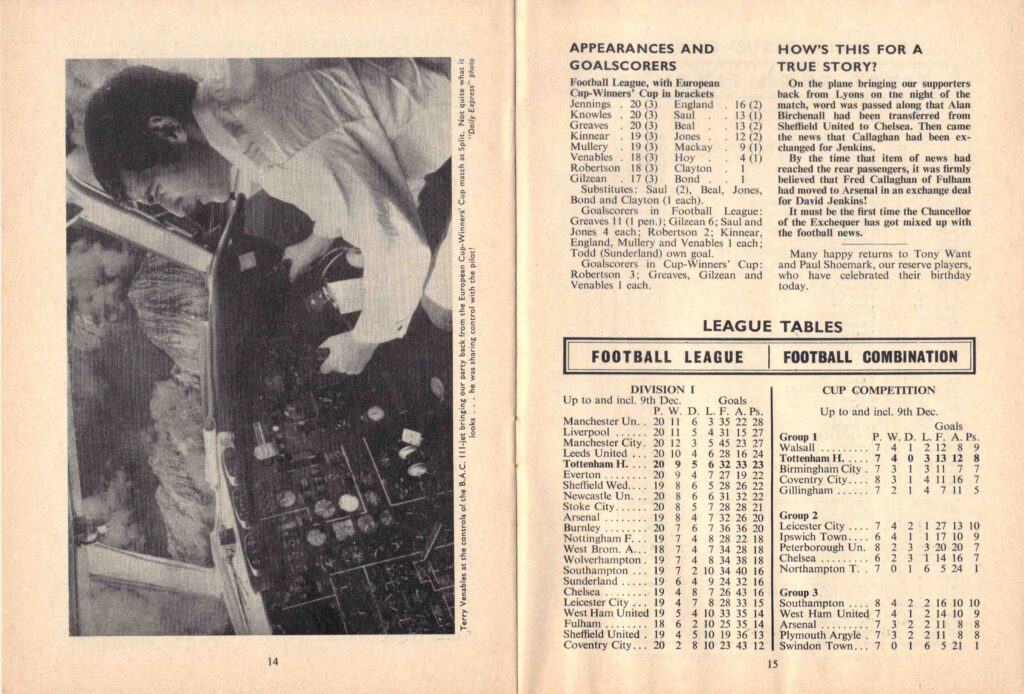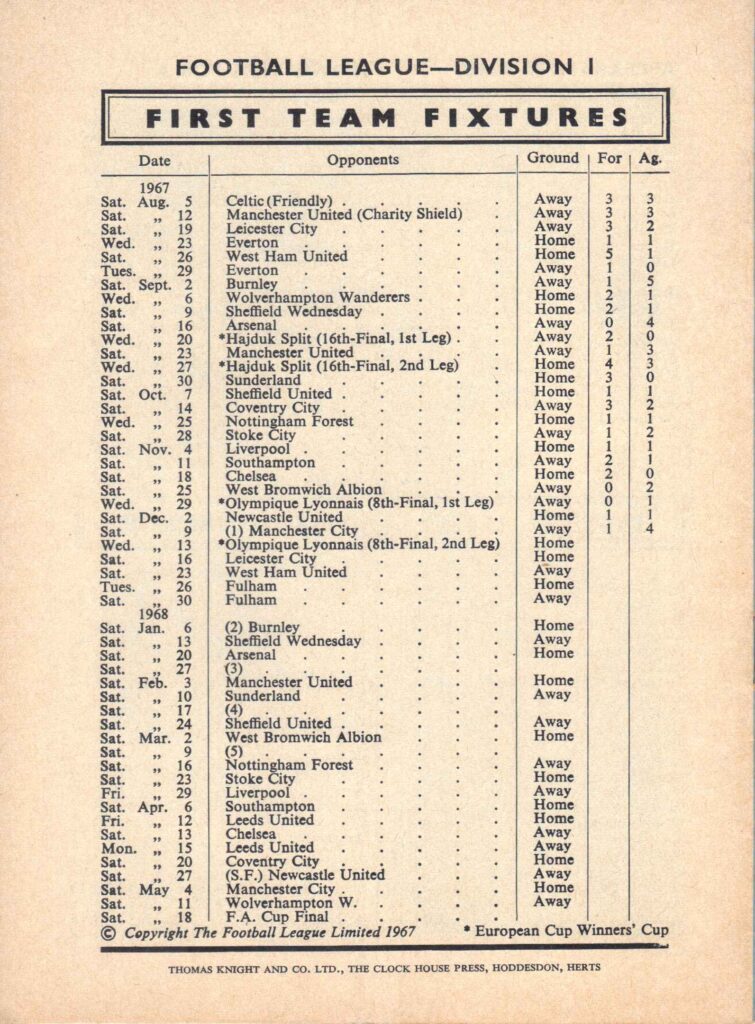A look back at Olympique Lyonnais’ second visit to Britain, in December 1967.
Match Date: Wednesday 13th December 1967, K.O. 19:45.
Venue: White Hart Lane, London.
Competition: European Cup Winners’ Cup (Second Round, Second Leg)
Just over six years after their first visit to the home of football, Olympique Lyonnais returned to England, touching down in London at the height of the Swinging Sixties. This time the occasion was a Cup Winners’ Cup Second Round tie against Spurs.
The year was 1967. Harold Wilson was in his second term as Prime Minister, the Six-Day War reshaped the Middle East, the first heart transplant was performed and America had a Summer of Love.
The Lyon party checked into the ten storey Alexandra National Hotel on the Seven Sisters Road in Finsbury Park, which had hosted teams during the previous year’s world cup. Had they ventured a few miles up the road to Enfield, they could have witnessed the world’s first cash machine, freshly installed at a branch of Barclays Bank.
In the weeks prior to this match, French President Charles de Gaulle had again vetoed British entry into the European Economic Community, but Anglo-French relations were healthy enough elsewhere as the countries collaborated on the development of the Concorde supersonic aeroplane.
The Beatles had even used the French national anthem as the intro to their hit single ‘All You Need is Love’ earlier that year, and the Liverpudlian supergroup had once again hit number one spot in the UK singles chart with ‘Hello Goodbye’ when the Lyon team arrived in Britain.
In sport, British cyclist Tom Simpson had tragically died whilst riding up Mont Ventoux in the 1967 Tour de France, which was eventually won by Frenchman Roger Pingeon. World heavyweight boxing champion Muhammad Ali was stripped of his titles and banned after refusing the draft to fight for the US army in Vietnam and Sir Francis Chichester, in his yacht, Gipsy Moth IV, became the first person to sail single-handedly around the world.
British football was at something of a peak, with England the reigning world champions and Celtic’s ‘Lisbon Lions’ had become the first British team to win the European Cup. Manchester United were champions of England, and Lyon’s rivals Saint-Étienne had won the French title.
Context
Lyon were in their sixth season of European football and their third Cup Winners’ Cup campaign, having won the 1967 Coupe de France with a 3-1 victory over Sochaux in the final. It was also Tottenham’s third Cup Winners’ Cup campaign but only their fourth European season in total. They had qualified through winning the 1967 FA Cup final 2-1 against Chelsea at Wembley.
Lyon had endured a disappointing league season in 1966-67, finishing in a lowly fifteenth place, just a couple of points above the relegation spots. Tottenham had fared a lot better in the English top flight, finishing in third place, four points behind champions Manchester United.
Legendary Tottenham manager Bill Nicholson was in his tenth season at the helm of the north London club, having already guided them to five major titles including the 1962-63 European Cup Winners Cup, when they became the first English team to win a European trophy. Only three players (Dave Mackay, Cliff Jones and Frank Saul) remained from his famous double-winning team of 1960-61.
Former Real Madrid and France defender Louis Hon was in his second season as Lyon manager, having moved to the club from Real Zaragoza in 1966. Angel Rambert was the only player in the Lyon squad who had featured in their previous match in England, against Sheffield Wednesday at Hillsborough six years earlier.
The Form Book
Lyon’s league form had been indifferent in the first half of the season and they had only picked up five wins from their opening eighteen Division 1 fixtures, one of those wins being a 2-1 home success against Rouen on the Sunday before their trip to England, which left them in fourteenth place.
Spurs were faring a bit better, sitting in fifth place in the table, five points off the top, but they had hit a mini slump in the run up to the visit of Lyon, losing three of their last four matches including a 4-1 hammering at Manchester City the weekend prior to this fixture.
That run included the first leg of this tie at the Stade de Gerland in Lyon a fortnight earlier, which Lyon won 1-0 thanks to a goal from Fleury di Nallo after seventy-five minutes. It was a bad tempered match in which Alan Mullery (Spurs) and Andre Guy (Lyon) were both sent off during a tempestuous first half.
Both clubs had enjoyed a perfect start to their European campaigns that season, winning both legs of their ties in the first round of the Cup Winners Cup. Lyon had beaten Aris Bonnevoie of Luxembourg 3-0 away and 2-1 at home whereas Spurs had won 2-0 away at Hajduk Split in Yugoslavia before edging the second leg 4-3 at home.
The Programme
The matchday programme was a much more substantial and informative affair than the one that Sheffield Wednesday had produced for Lyon’s first visit to Britain six years earlier and, at sixpence, was three times the price. That was in ‘old money’ as the UK was still a few years away from the decimalisation of the currency.
It was a sixteen page booklet with a French language welcome to the visitors followed by an overview of Olympique Lyonnais, the city of Lyon and French football in general. Twelve of the Lyon players were profiled with cursory biographical information and there was a brief summary of the other ties in the competition alongside a look at previous meetings between Spurs and French opposition.
In the opening column, the hosts expressed a wish that the match would be played in ‘a sporting atmosphere‘ without any of the ‘regrettable incidents‘ that had ‘marred the first leg‘, alluding to the on-field altercations between players in Lyon.
Elsewhere, they remarked on the ‘small crowds‘ of around 8,000 that Lyon would typically draw for their home fixtures at the time, and on the dwindling size of football attendances in France in general due to ‘a serious slump in public interest over recent years in club football‘.
The section on the history, geography and industry of Lyon was rather in depth for programmes of the era. So much so that the author felt an explanation was necessary, concluding with ‘we present these facts in the belief that in this modern, ever-widening world of travel, many supporters will be interested in the home environment of our opponents tonight‘, as though taking an interest in foreign people and places was somewhat controversial, or at least unconventional.
Another section that betrays the relative insularity and lack of diversity in British football at the time appears when the author marvels at the prevalence of players from other countries and ethnic backgrounds: ‘There is one aspect of French football, however, that retains its fascination. It is cosmopolitan in the constitution of its club teams. Playing in League football in France today are 13 Argentinians, 1o Italians, seven Yugoslavs and several coloured players‘.
Evidently in 1960’s Britain it was still considered noteworthy when a visiting team arrived with black players in their ranks and, as in the Sheffield Wednesday versus Lyon programme from six years earlier, the word ‘coloured’ was still in common parlance as an acceptable adjective for them.
Match Report
This was, by all accounts, an enthralling contest that swung back and forth several times and was on a knife edge until the very end. A seven goal thriller in which each goal changed the balance of the tie.
Jimmy Greaves opened the scoring in the twentieth minute, ghosting in behind the Lyon defence to meet a headed flick-on and volley home from close range. That goal cancelled out Lyon’s advantage from the first leg and would have sent the tie into extra time and a potential drawing of lots, had it stayed that way.
However, the possibility of extra time was extinguished just before the interval when Dennis Bond, in for the suspended Mullery, made a fine run into the Lyon box and was brought down by a clumsy challenge. The Spanish referee had no hesitation in pointing to the spot and Greaves stepped up to convert the penalty low to the goalkeeper’s right and put Spurs ahead in the tie.
Lyon began the second half in determined fashion and the momentum soon swung back in their favour when home goalkeeper Pat Jennings failed to fully deal with a long-range effort, pushing the ball back into the path of Fleury di Nallo, who had the simple task of tapping the rebound into the gaping net. At 2-1 on the night, Lyon were now ahead on away goals.
Within a minute, Spurs were back in the driving seat as left winger Cliff Jones timed his run perfectly to meet a cross from the opposite flank and score with a diving header at the far post. This quick flurry of goals was rounded off a couple of minutes later when Angle Rambert finished off a well-worked move with a neat left-footed shot to beat Jennings from a tight angle and restore Lyon’s advantage.
It stayed that way until the 69th minute when Alan Gilzean beat the Lyon offside trap and had time to bring the ball down with his chest before slotting it home from close range to make it 4-2 to Spurs on the night and once again put the Londoners ahead on aggregate.
Lyon were forced to try and respond for a third time and with ten minutes to go, they did just that. A promising attack down the right made it all the way to the Spurs byline and a dangerous cross was lifted into area. Mohamed Bouassa evaded the attention of two defenders to head the ball into the net from point-blank range and score what proved to be the decisive goal.
Lyon managed to see out the final ten minutes and progress to the next round by the narrowest of margins, losing 4-3 on the night but drawing 4-4 on aggregate and winning on away goals. There is some (very grainy) footage of the match highlights available here on YouTube.
Significance
The elimination of Tottenham has to be considered a massive upset given the relative strength, reputation and history of the two clubs at the time. This match is fondly remembered in Lyon as the club’s ‘premier grand exploit‘, their ‘first great feat’ in European football, although only around twenty of their supporters are said to have made the trip to witness it in person.
Lyon were paired with German club Hamburg in the next round, which was the quarter-finals. They lost the first leg 2-0 away in February 1968 but won the return 2-0 at home three weeks later to set up a deciding play-off match. That took place back in Hamburg and Lyon again lost 2-0 on German soil and exited the competition. Hamburg went on to lose the final 2-0 to AC Milan.
Lyon made a fourth and final appearance in the European Cup Winners’ Cup in the 1973-74 season where they lost to PAOK of Greece in the second round. Tottenham made three further appearances in the competition but were unable to replicate their triumph of 1963 before the tournament was discontinued in 1999.
Lyon’s league form continued to be underwhelming for the remainder of the 1967-68 season and they plodded along in lower-mid-table, eventually finishing twelfth. Manager Louis Hon left at the end of the season to be replaced by Aimé Mignot. Tottenham finished seventh in the English First Division.
As noted in the programme, Lyon were the first French team to play a competitive match at White Hart Lane, although the ground had previously hosted friendlies against French opposition, including Tottenham’s first ever floodlit match at the stadium, against Racing Club de Paris in September 1953.
Lyon did not return to White Hart Lane until February 2013 for a first-knockout-round tie in the 2012-13 Europa League and lost 2-1 in London before a 1-1 draw back at Gerland saw Spurs progress 3-2 on aggregate.
The Protagonists
The Spurs team that evening was packed with stellar names, many of whom are now considered club legends. Foremost among them perhaps, was Jimmy Greaves. A member of England’s World Cup winning squad of 1966, he is Tottenham’s all-time record goalscorer and the highest goalscorer in the history of English top-flight football. He finished as top scorer in the English First Division in a record six different seasons.
Greaves was also the England national team’s record goalscorer at the time of Lyon’s visit to White Hart Lane, having scored his 44th and final international goal earlier that year. His tally would be overtaken by Bobby Charlton in May 1968 and he is now fourth on that list.
Cyril Knowles and Terry Venables completed the trio of England internationals in the Tottenham line-up against Lyon. Left-back Knowles was a club stalwart, who made over 500 appearances for Spurs and Venables went on to become a successful manager with Barcelona, Spurs and the England national team.
The other home nations and Ireland were all well represented by internationals in that Tottenham team. Jimmy Robertson, Alan Gilzean and Dave MacKay were all capped by Scotland, with the latter considered one of Tottenham’s greatest ever midfielders. As a manager, MacKay would go on to lead Derby County to the league title.
Winger Cliff Jones was a Welsh international, right-back Joe Kinnear won 26 caps for the Republic of Ireland and goalkeeper Pat Jennings was once the record appearance holder for Northern Ireland with 119 caps. In 1986, on his 41st birthday, he became the oldest player ever to have appeared in a World Cup finals match.
The only two uncapped players in the line-up were the inexperienced pair of Roger Hoy and Dennis Bond. Neither player made many first team appearances for Tottenham and this fixture would have been one of the biggest matches of their careers.
In stark contrast to the 312 international caps that the Tottenham XI would accumulate during their careers, the Lyon line-up at White Hart Lane that evening would only muster a grand total of 54 caps between them, with the majority of those being for Luxembourg and Morocco, which is a good indicator of the gulf in class between the two teams.
Like Spurs, Lyon had the man who remains their all-time record goalscorer on the pitch that night in Fleury Di Nallo. The striker, nicknamed ‘le petit prince de Gerland‘, earned ten caps for France, and is one of the most fêted players in Lyon’s history, having played almost 500 games and scored 222 goals for the club between 1960 and 1974, winning the Coupe de France three times along the way.
Goalkeeper Yves Chauveau was another who left his mark on the history of the club, also amassing almost 500 appearances for them during two spells at Gerland. He hadn’t played in the cup final the previous season, but became first choice early in this campaign aged just twenty-two.
Despite conceding four goals, he was widely acknowledged as the man of the match against Spurs and was reportedly nicknamed ‘the devil’ and ‘the flying goalkeeper’ in the English papers the next morning. He went on to win the Coupe de France with Lyon in 1973 and later won promotion and then the league title with Monaco, but earned just a solitary cap for France.
Of the others in the Lyon XI, only Angel Rambert and Bernard Lhomme left much impression on the club’s history. Rambert was an Argentinian born winger and naturalised Frenchman who was capped five times by his adoptive country. He spent a decade at the club from 1960-70, winning the Coupe de France twice and made almost 400 appearances. Lhomme was a one-club man who made just short of 300 appearances for Lyon at full-back between 1966 and 1976 and was part of the 1973 cup winning team.
Nobody else from the teamsheet against Spurs spent more than three seasons in Lyon. Luxembourg international full-back Erwin Kuffer and Hector Maison, an Argentinian, were both there from 1966-69. René Rocco, an Italian who spent his entire career in France, was in the second of his two seasons with the club, as was Raymond Schwinn.
Yves Flohic was there from 1967-70, but made only 58 appearances during his spell at the club and Jacky Pin was playing his only full season at Lyon, having been signed from Aix in 1966, but loaned out to Ajaccio during the subsequent campaign.
By far the most enigmatic character on the pitch was the scorer of the decisive goal. Twenty-three year old Moroccan Mohamed Bouassa had joined the club in the summer and had only made one previous appearance when he was surprisingly thrown in at the deep end for this match. His 79th minute strike at White Hart Lane was his only goal for Lyon and he featured in just six games during his two years at the club. Tragically, just three and a half years after his heroics against Spurs, he was dead, stabbed outside a bar in his native Casablanca.
Line-Ups
Tottenham Hotspur
Pat Jennings
Roger Hoy
Cyril Knowles
Joe Kinnear
Dennis Bond
Terry Venables
Jimmy Robertson
Dave MacKay
Alan Gilzean
Cliff Jones
Jimmy Greaves
Manager
Bill Nicholson
– – – – –
Olympique Lyonnais
Yves Chauveau
Bernard Lhomme
Erwin Kuffer
Yves Flohic
Mohamed Bouassa
Raymond Schwinn
René Rocco
Hector Maison
Angel Rambert
Jacky Pin
Fleury Di Nallo
Manager
Louis Hon
Goals: Greaves (20′), Greaves (45′ pen), Di Nallo (54′), Jones (55′), Rambert (57′), Gilzean (69′), Bouassa (79′)
Referee: José Ortíz De Mendibíl
